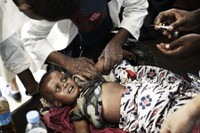Live Aid Year
1985 (Live Aid year)
The Christmas song "Do they know its Christmas" is launched by a group of artists called "Band Aid" drawing attention to the plight of those starving in Ethiopia. The song sells a record 3.5 million copies and generates a huge feeling of solidarity amongst the Western public.
Following this success, Live Aid, a rock concert split between London and Philadelphia is organised to help victims of the Ethiopian famine. Up to 400 million people watch or listen to the concert and it was an enormous financial success (with nearly £150m gross funds raised). Popular optimism about the West's ability to solve Africa's long standing problems is generated. Bob Geldof becomes a respected opinion leader on the problems of Africa and how to solve them.
After Live Aid there came both a sense of of anti-climax and controversy. Anti-climax because the famine was not "a famine to end all famines" and the response was short term. Controversy because inevitably questions were raised by the BBC and others about whether the funds raised were spent sensibly and whether the funds prolonged the conflict underlying the famine.
Nonetheless, Live Aid showed people cared. It started a level of popular interest in international aid and development amongst parts of the population (especially the young) who had never previously been interested and it set expectations of aid amongst a generation who are now, twenty five years later, core financial supporters of many NGOs.
South Africa: Desmond Tutu is awarded the Nobel Peace Prize.
Uganda: Milton Obote, the Ugandan president who had been toppled by Idi Amin in 1971, but had regained the presidency in 1980 is toppled from power again in a bloodless Uganda coup.
Somalia: SOS Children opens a Children's Village in Mogadishu, Somalia, offering family based care to the increasing numbers of orphans there.

 Return to Schools Wikipedia Home page…
Return to Schools Wikipedia Home page…
